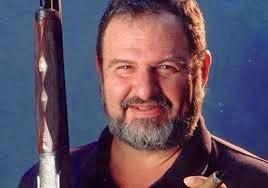 John Milius is a true Hollywood original. As a screenwriter he's penned some of cinema's most quotable scripts: Dirty Harry, Magnum Force, Jaws' Indianapolis monolog and Apocalypse Now among them. As director, his efforts range from stellar (The Wind and the Lion) to kitschy (Red Dawn) to terrible (Farewell to the King). Offscreen he's remembered as a right wing wild man toting a gun in one hand, a surfboard in the other, sunglasses and scruffy beard completing the ensemble.
John Milius is a true Hollywood original. As a screenwriter he's penned some of cinema's most quotable scripts: Dirty Harry, Magnum Force, Jaws' Indianapolis monolog and Apocalypse Now among them. As director, his efforts range from stellar (The Wind and the Lion) to kitschy (Red Dawn) to terrible (Farewell to the King). Offscreen he's remembered as a right wing wild man toting a gun in one hand, a surfboard in the other, sunglasses and scruffy beard completing the ensemble. Joey Figueora and Zak Knutson's stellar documentary gives Milius his due. Milius (2013) is a wide-ranging, irreverent not always flattering but always compelling portrait of this one-of-a-kind director.
Milius's first appeal the incredible star power. and assemble seemingly every Milius acquaintance: actors Clint Eastwood, Arnold Schwarzenegger, Harrison Ford, Charlie Sheen and Richard Dreyfus; directors Steven Spielberg, Martin Scorsese, Francis Ford Coppola and George Lucas; his son Ethan, daughter Amanda and numerous friends. And that's only a partial list. Milius himself, incapacitated by a 2010 stroke, features mainly through archival interviews.
Like most movie brats, Milius enjoyed a comfortable middle-class childhood. Born in St. Louis, Missouri, he grew up comfortable in California. Yet he soon developing a nonconformist personality, a tough guy who enjoyed surfing and carousing. Milius candidly describes his desire to serve in Vietnam and die by age 26 - an aspiration foiled by asthma. Disheartened, Milius channeled his fantasies into filmmaking.
Milius attended USC alongside future legends Spielberg, Coppola, Scorsese, Lucas, Randal Kleiser and Caleb Deschanel. Milius befriended them all, standing apart for his personality and his undeniable talent. An early student film, Marcello I'm So Bored, announced his literary skills - mixing aureate prose with snide self-awareness - to Hollywood. Soon Milius wound up writing screenplays for American International Pictures including a biopic of Evel Kenievel featuring George Harrison.
These early segments bristle with wild anecdotes, sketching Milius's outsized persona. Milius relished, rarely appearing without a firearm, a sombrero and sunglasses, describing himself as a "zen anarchist" and a right-wing hippie. Friends recount Milius demanding "girls, gold and guns" in exchange for a screenplay, or bringing a loaded Colt 1911 to a pitch meeting. The Big Lebowski's Walter Sobchak, supposedly inspired by Milius, seems comparatively demure.
Milius's career arc is even more impressive. He broke out of the B movie ghetto by scripting The Life and Times of Judge Roy Bean and Jeremiah Johnson (both 1972). AIP tapped him to direct Dillinger (1973), a wild mix of comic strip violence and outlaw romanticism. Milius leapt to MGM for his next project, the magisterial The Wind and the Lion (1975). Milius's surf epic Big Wednesday (1978) flopped, but Apocalypse Now (1979) restored his critical cache while Conan the Barbarian (1982) and Red Dawn (1984) proved blockbuster hits.
Milius's success is impressive enough, yet Milius (and the documentary) occasionally gild the lily. Milius implies he wrote Dirty Harry singlehanded, even though at least four others contributed. Similarly, the segment on Apocalypse Now ignores how much Coppola's end product differs from Milius's bizarre script (which ended in a cape-wearing Kurtz leading his tribesmen in a pitched battle). Steven Spielberg does challenge Milius on Jaws' famous Indianapolis speech, showing that Robert Shaw heavily rewrote Milius's efforts.
Yet soon afterwards, Milius's career stagnated. Through the '80s he returned to screenwriting, penning Extreme Prejudice, Clear and Present Danger and Geronimo: An American Legend alongside unproduced projects. Another anecdote has Sean Connery, unsatisfied with The Hunt for Red October's screenplay, requesting Milius as his personal script doctor! But his two directorial efforts, Farewell to the King (1989) and Flight of the Intruder (1991), were expensive, critically-panned flops which buried his career.
Here the docu nearly loses perspective. Milius enjoys painting himself a martyr to "liberal Hollywood," a notion humored by several interviewees. Yet Clint and Arnold deflate his theory, noting their careers were never hurt by conservatism. Certainly there's much to support this: there's a snippet of a producer's meeting on Big Wednesday, where Milius reams out a producer for impugning his masterwork. He wouldn't be the first filmmaker done in by throbbing ego mixed with box office failure. Sam Elliot's observation seems prescient: Milius just pissed off too many people.
Regardless, Milius's decline makes for sad viewing. His TV film Rough Riders (1997) earned respectful reviews but didn't lead to more work. An accountant friend absconded with Milius's money, leaving him in dire financial straits. (Milius's son Ethan, now an Assistant DA, painfully recounts how Milius begged out assignments to cover Ethan's law school.) His work on HBO's Rome brought renewed acclaim, but Milius suffered a debilitating stroke, followed by pancreatic cancer. The end title promises future projects like a Genghis Khan biopic, yet these have long languished in development hell.
John Milius doesn't match his peers Spielberg, Coppola and Scorsese as an all-time auteur. But the man who wrote Apocalypse Now and directed The Wind and the Lion earned his place in cinema history. And Figueora and Knutsen do this unique filmmaker justice.

